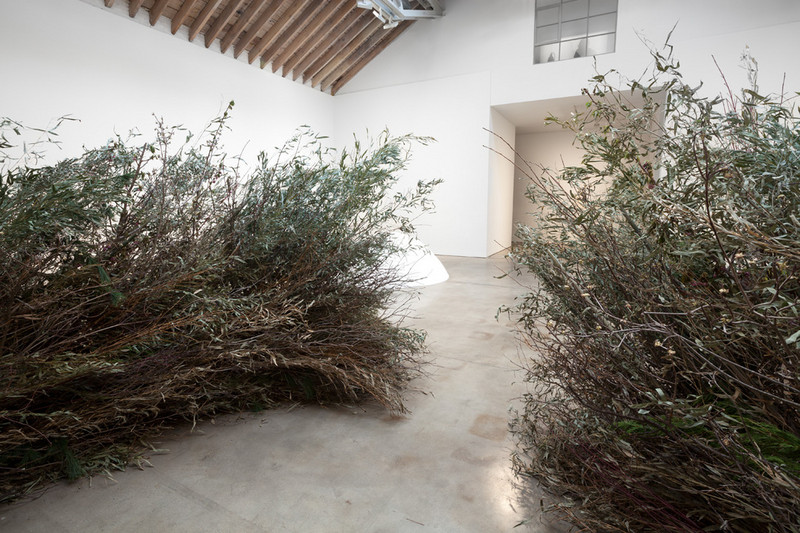Meg Webster
07 May - 12 Jul 2016

© Meg Webster
Stick Structure, (detail), 2016
various branches, twigs, and flowering plants
approximately 72 x 192 inches in diameter (182.8 x 487.6 centimeters)
Stick Structure, (detail), 2016
various branches, twigs, and flowering plants
approximately 72 x 192 inches in diameter (182.8 x 487.6 centimeters)
MEG WEBSTER
7 May – 12 July 2016
NEW YORK—Paula Cooper Gallery is pleased to present an exhibition of new work by Meg Webster. The exhibition will be on view from May 7 – July 12, 2016.
Meg Webster’s work finds inspiration in the intrinsic beauty of natural materials. Using metal, glass and organic elements like salt, soil, twigs and moss, the artist creates large-scale installations and precise structures rooted in the traditions of Land Art of the 1970s. Also highly influenced by Minimalist artists like Donald Judd, Carl Andre and Robert Morris, Webster draws on their rigorous formal vocabulary to create simple, geometric forms that directly and perceptually engage the body and its senses.
In Volume for Lying Flat, Webster structures peat and green moss to create a human-sized bed. Familiar associations of pleasure, fertility and slumber, coincide with the sight and scent of fresh, damp moss. A “living” work, Volume for Lying Flat requires light, water and continual care and attention.
For Stick Structure, Webster’s collects branches, twigs and flowering plants that converge to form an enclosed circle. The ephemeral installation draws from various local gardens, with shrubbery gathered recently enough to bear florae of the current season. As the viewer walks through, enveloped by the scents and textures of his or her surroundings.
Nine thousand pounds of coarse salt form a smooth 5-foot swell entitled Mother Mound Salt. A monument to the earth and its bounty, the work evokes the curve of the earth or the tumescent bend of a pregnant belly. Its primal form and grand scale belie its delicate materiality of millions of individual crystals.
First created for Webster’s recent show at Villa Panza, “Natura Naturans,” Solar Grow Room is an ecosystem sustained by solar panels on the gallery exterior. Bathed in pink light, raised planters are cultivated with moss, grass, flowers and other vegetation. A lifelong environmentalist, Webster draws awareness to nature as an ever-evolving force, as well as mankind’s careless destruction of the earth’s resources and energies.
Meg Webster was born in San Francisco in 1944. She received an MFA from Yale University in 1983. Webster’s work has been exhibited at the Solomon R. Guggenheim Museum, New York; the Tel Aviv Museum of Art; the Rooseum, Malmö, Sweden; the Whitney Museum of American Art in New York; and the P.S.1 Contemporary Art Center in Long Island City, New York. Most recently, Webster participated in the two-person exhibition, “Natura Naturans” at Villa Panza in Varese Italy. She will present her large-scale earthwork, Concave Room for Bees, at Socrates Sculpture Park, commissioned for their May 2016 exhibition, “LANDMARK.”
Webster lives and works in New York.
7 May – 12 July 2016
NEW YORK—Paula Cooper Gallery is pleased to present an exhibition of new work by Meg Webster. The exhibition will be on view from May 7 – July 12, 2016.
Meg Webster’s work finds inspiration in the intrinsic beauty of natural materials. Using metal, glass and organic elements like salt, soil, twigs and moss, the artist creates large-scale installations and precise structures rooted in the traditions of Land Art of the 1970s. Also highly influenced by Minimalist artists like Donald Judd, Carl Andre and Robert Morris, Webster draws on their rigorous formal vocabulary to create simple, geometric forms that directly and perceptually engage the body and its senses.
In Volume for Lying Flat, Webster structures peat and green moss to create a human-sized bed. Familiar associations of pleasure, fertility and slumber, coincide with the sight and scent of fresh, damp moss. A “living” work, Volume for Lying Flat requires light, water and continual care and attention.
For Stick Structure, Webster’s collects branches, twigs and flowering plants that converge to form an enclosed circle. The ephemeral installation draws from various local gardens, with shrubbery gathered recently enough to bear florae of the current season. As the viewer walks through, enveloped by the scents and textures of his or her surroundings.
Nine thousand pounds of coarse salt form a smooth 5-foot swell entitled Mother Mound Salt. A monument to the earth and its bounty, the work evokes the curve of the earth or the tumescent bend of a pregnant belly. Its primal form and grand scale belie its delicate materiality of millions of individual crystals.
First created for Webster’s recent show at Villa Panza, “Natura Naturans,” Solar Grow Room is an ecosystem sustained by solar panels on the gallery exterior. Bathed in pink light, raised planters are cultivated with moss, grass, flowers and other vegetation. A lifelong environmentalist, Webster draws awareness to nature as an ever-evolving force, as well as mankind’s careless destruction of the earth’s resources and energies.
Meg Webster was born in San Francisco in 1944. She received an MFA from Yale University in 1983. Webster’s work has been exhibited at the Solomon R. Guggenheim Museum, New York; the Tel Aviv Museum of Art; the Rooseum, Malmö, Sweden; the Whitney Museum of American Art in New York; and the P.S.1 Contemporary Art Center in Long Island City, New York. Most recently, Webster participated in the two-person exhibition, “Natura Naturans” at Villa Panza in Varese Italy. She will present her large-scale earthwork, Concave Room for Bees, at Socrates Sculpture Park, commissioned for their May 2016 exhibition, “LANDMARK.”
Webster lives and works in New York.
